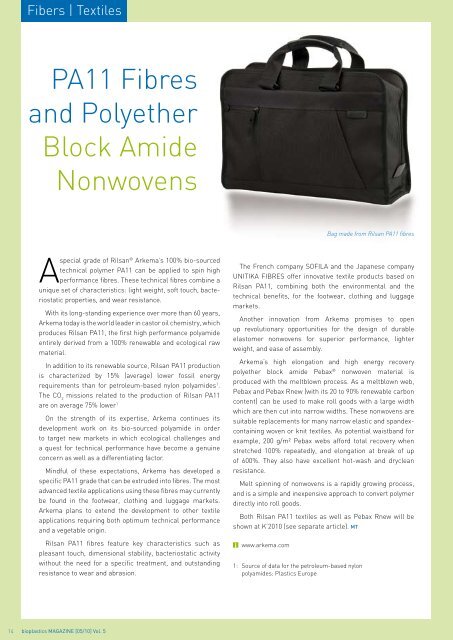05 | 2010
You also want an ePaper? Increase the reach of your titles
YUMPU automatically turns print PDFs into web optimized ePapers that Google loves.
Fibers | Textiles<br />
PA11 Fibres<br />
and Polyether<br />
Block Amide<br />
Nonwovens<br />
Bag made from Rilsan PA11 fibres<br />
A<br />
special grade of Rilsan ® Arkema’s 100% bio-sourced<br />
technical polymer PA11 can be applied to spin high<br />
performance fibres. These technical fibres combine a<br />
unique set of characteristics: light weight, soft touch, bacteriostatic<br />
properties, and wear resistance.<br />
With its long-standing experience over more than 60 years,<br />
Arkema today is the world leader in castor oil chemistry, which<br />
produces Rilsan PA11, the first high performance polyamide<br />
entirely derived from a 100% renewable and ecological raw<br />
material.<br />
In addition to its renewable source, Rilsan PA11 production<br />
is characterized by 15% (average) lower fossil energy<br />
requirements than for petroleum-based nylon polyamides 1 .<br />
The CO 2<br />
missions related to the production of Rilsan PA11<br />
are on average 75% lower 1<br />
On the strength of its expertise, Arkema continues its<br />
development work on its bio-sourced polyamide in order<br />
to target new markets in which ecological challenges and<br />
a quest for technical performance have become a genuine<br />
concern as well as a differentiating factor.<br />
Mindful of these expectations, Arkema has developed a<br />
specific PA11 grade that can be extruded into fibres. The most<br />
advanced textile applications using these fibres may currently<br />
be found in the footwear, clothing and luggage markets.<br />
Arkema plans to extend the development to other textile<br />
applications requiring both optimum technical performance<br />
and a vegetable origin.<br />
Rilsan PA11 fibres feature key characteristics such as<br />
pleasant touch, dimensional stability, bacteriostatic activity<br />
without the need for a specific treatment, and outstanding<br />
resistance to wear and abrasion.<br />
The French company SOFILA and the Japanese company<br />
UNITIKA FIBRES offer innovative textile products based on<br />
Rilsan PA11, combining both the environmental and the<br />
technical benefits, for the footwear, clothing and luggage<br />
markets.<br />
Another innovation from Arkema promises to open<br />
up revolutionary opportunities for the design of durable<br />
elastomer nonwovens for superior performance, lighter<br />
weight, and ease of assembly.<br />
Arkema’s high elongation and high energy recovery<br />
polyether block amide Pebax ® nonwoven material is<br />
produced with the meltblown process. As a meltblown web,<br />
Pebax and Pebax Rnew (with its 20 to 90% renewable carbon<br />
content) can be used to make roll goods with a large width<br />
which are then cut into narrow widths. These nonwovens are<br />
suitable replacements for many narrow elastic and spandexcontaining<br />
woven or knit textiles. As potential waistband for<br />
example, 200 g/m² Pebax webs afford total recovery when<br />
stretched 100% repeatedly, and elongation at break of up<br />
of 600%. They also have excellent hot-wash and dryclean<br />
resistance.<br />
Melt spinning of nonwovens is a rapidly growing process,<br />
and is a simple and inexpensive approach to convert polymer<br />
directly into roll goods.<br />
Both Rilsan PA11 textiles as well as Pebax Rnew will be<br />
shown at K’<strong>2010</strong> (see separate article). MT<br />
www.arkema.com<br />
1: Source of data for the petroleum-based nylon<br />
polyamides: Plastics Europe<br />
14 bioplastics MAGAZINE [<strong>05</strong>/10] Vol. 5


















